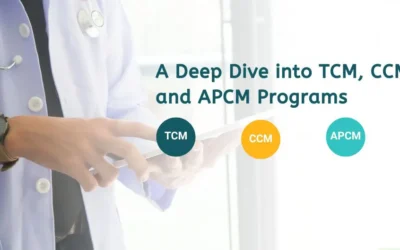
The Power of Modern Technology in Chronic Care Management
Incorporating healthcare technology in CCM has many benefits, including connectivity and convenience, as well as the accuracy of the process itself. Specific applications such as telephonic software and live texting, for example, should assist CCM programs in improving patients’ results by filling gaps in communication and opening up possibilities for more expeditious and appropriate care. This is especially the case with the rural and elderly population that may be unable to visit the provider’s office and need easy contact methods.
It can also be seen that healthcare technology can help with the continuity of care. Telecommunications and EHRs are two technologies that increase specificity and accuracy in treatment because providers and care managers have increased and immediate access to the right information on the medical history and plans for the patient’s care.
While these solutions appear to be a great approach to Chronic Care Management, implementing emerging technologies in practice can be difficult for individual practitioners. Organizing a Chronic Care Management partner relieves your staff and allows your practice to capture the Chronic Care Management value of the most modern technology.
9 Top Healthcare Technologies for CCM
- Cloud data sharing
When used in Chronic Care Management, cloud data sharing means that patient data is stored in a secure cloud-based platform. This healthcare technology enhances continuity of care since key data and communications regarding a patient’s health are made easily accessible and accessible to the providers.
Cloud data sharing also helps in constant updates, so you can make valuable care decisions based on the patient’s data. HIPAA is a fundamental requirement that must be met in any organization handling personal health information hence the need to adopt this HIPAA solution only.
- Electronic health records (EHR)
Electronic health records (EHR) are defined as a centralized source where a patient’s complete health history can be obtained. When used optimally, these tools offer a nearly holistic view of a patient’s status across multiple healthcare settings, providers, and visits. For CCM programs, an EHR provides a patient’s history of chronic conditions for documenting changes or improvements in the disease process.
An EHR also fosters patient self-management of chronic diseases, empowering patients to take an active role in their care. It makes patients informed on what is happening to them and makes available to them visit notes and lab results, other aspects of EHRs empower patients to make progress between more formal encounters of care.
- Artificial Intelligence (AI)
A few CCM software vendors use AI to enhance the quality of chronic illness care. We have an AI solution that is HIPAA compliant and can analyze 100% of patient calls for quality, documentation, and CMS compliance. The generated data help in making changes to increase patient satisfaction and overall quality of care.
Chronic Care Management is also being revolutionized by AI by giving the industry new approaches to data interpretation and patient care. For instance, using AI predictive modeling one can identify a patient’s vital signs, SDOH difficulties, and other aspects that predispose a patient to complications. Such tools are useful to identify issues before they happen to allow for a more effective and efficient treatment solution. Generative AI can also help to keep patient engaged in their care by developing realistic care goals or assembling patient-friendly educational content based on patient characteristics.
- Time-tracking tools
Accuracy is important in healthcare, and technology plays a key role in achieving it. Time-tracking tools, like the ones embedded in our CCM software, help teams establish an accurate record of time spent with patients. That data then informs precise billing and patient monitoring.
Time-tracking software is particularly important in CCM, where insufficient patient support can result in suboptimal patient outcomes and compliance issues. Time-tracking tools also help CCM providers identify which patients require more frequent care so that they can allocate resources efficiently.
- Telephonic software
Phone technologies are intermediate between face-to-face care and the ongoing and long-term management of chronic conditions. Telephonic software brings problems to the surface and prompts early intervention because of the ease of contact that is provided.
Furthermore, telephonic software supports modern technology as a solution to the challenges affecting the healthcare sector through enhancing access to healthcare. Patients are always able to reach the care that they require, wherever they may be. Telephonic tools eliminate the need to have physical contact with the patient to provide timely support.
- Reporting software
Reporting tools also assist the providers to identify from the patient health data the need to take some action. By identifying the most relevant healthcare trends, documentation tools improve the organizational aspects of care. Similarly, these tools assist clinicians in assessing the outcomes of treatment and the modification of the course of action.
The fact that reporting software allows CCM programs to keep patients in the loop on their health trajectory makes the software particularly important. Self-management is possible for the patient on consideration of the fact that reporting tools are transparent. The patients acquire the information that enables them to take responsibility for their outcomes.
- Analytical tools
In addition to reporting software, analytics tools are even more valuable for patients and providers by not only presenting the data but also by determining what the reported data means and how patients and providers should proceed to receive the best possible treatment. Finally, analytics tools can also reveal areas of care omissions or even suggest treatment regimens that will contribute to patients’ well-being.
Clinical analytics can save costs, enable better decision-making, and identify patients who are likely to experience complications from clinical teams by assisting in making sense of the data. When integrated with other technologies such as phone applications and artificial intelligence, this healthcare technology has the potential to improve patients’ health.
- Live texting
Live texting is yet another way through which the patient and the provider can engage in a conversation. When applied to CCM, live texting may enhance medication compliance by providing timely cues or offering the patient an alternative method for reaching out to the care managers with health concerns. Live texting can also be a strategic decision for providers because it is even more convenient for patients and they have a simple way to inform them of problems or ask for assistance.
- Remote patient care
Various ways have been brought about by technology that has transformed the way patients receive their care. Flexible and reachable care options are a way of mitigating some of the barriers that many patients experience whenever they are seeking a care service such as time, means of transport, or even mobility.
For CCM programs, remote care services are extra healthcare possibilities. It could also enable patients to talk with care managers around the clock using text or voice.
Gen By Gen Health's turn-key CCM/RPM solutions ensure compliance and health literacy – improving patient satisfaction and outcomes, increasing revenue, and decreasing staff workload.
To get in touch call us right now at (908)-864-0098 to learn more about our CCM services or you can also book a 30 min free consultation.
You may also like
The Power of Patient Engagement in Driving Better Outcomes
Using patient engagement strategies requires intentional action, but the benefits are significant. People engaged in their care usually follow care plans, control their chronic health problems well, and stay in touch with their doctors. When you start focusing on...
Advance Primary Care Management (APCM) and Who Can Bill For It
Advanced Primary Care Management (APCM), which started in 2025, is the latest care management program from CMS. Unlike older care management plans, it supports every Medicare beneficiary, irrespective of how many chronic conditions they have. As APCM is just starting,...
A Deep Dive into TCM, CCM, and APCM Programs
Transitional Care Management (TCM) is a service that allows Medicare to pay for help given to a person transitioning from a hospital to their home. TCM strives to prevent patients from being readmitted in the first 30 days after they leave the hospital. At this point,...



